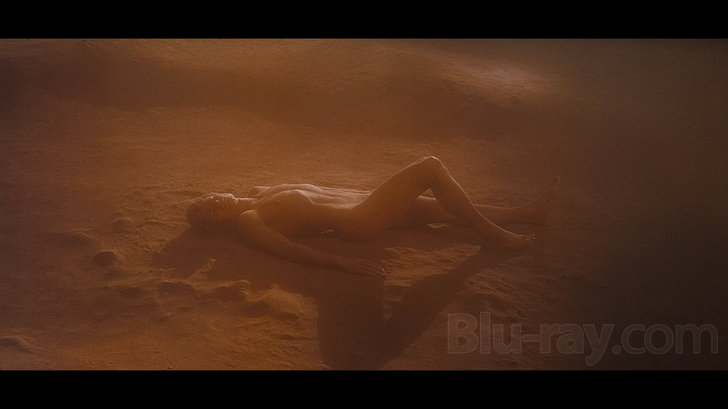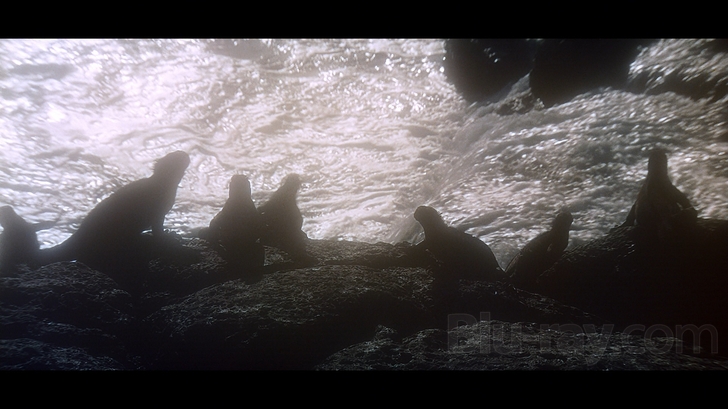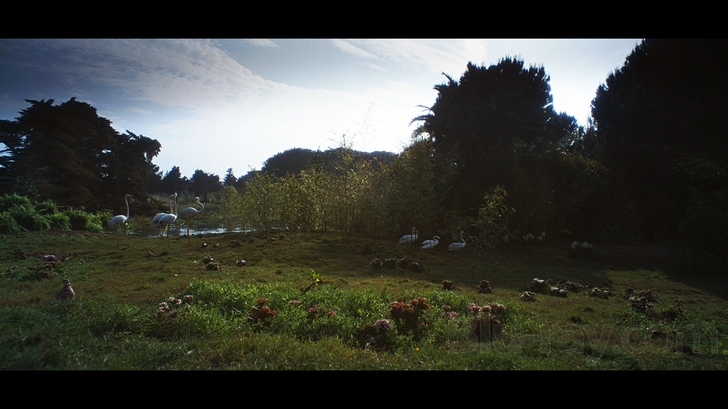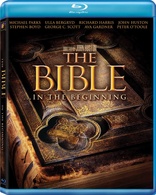The Bible: In the Beginning... Blu-ray Movie
HomeThe Bible: In the Beginning... Blu-ray Movie 
20th Century Fox | 1966 | 174 min | Not rated | Mar 22, 2011Movie rating
6.5 | / 10 |
Blu-ray rating
| Users | 4.8 | |
| Reviewer | 3.5 | |
| Overall | 3.7 |
Overview
The Bible: In the Beginning... (1966)
John Huston's epic recounts the first 22 chapters of Genesis, and includes an all star cast including George C. Scott, Peter O'Toole and Ava Gardner.
Starring: Michael Parks, Ulla Bergryd, Richard Harris (I), John Huston, Stephen BoydNarrator: John Huston
Director: John Huston
| Drama | 100% |
Specifications
Video
Video codec: MPEG-4 AVC
Video resolution: 1080p
Aspect ratio: 2.19:1
Original aspect ratio: 2.20:1
Audio
English: DTS-HD Master Audio 5.1
English: Dolby Digital 4.0
Spanish: Dolby Digital 5.1
French: DTS 5.1
Portuguese: Dolby Digital 5.1
Danish: Dolby Digital 5.1
German: DTS 5.1
Italian: DTS 5.1
Norwegian: Dolby Digital 5.1
Russian: DTS 5.1
Spanish: DTS 5.1
Polish: Dolby Digital 5.1
Subtitles
English SDH, French, German, Italian, Portuguese, Spanish, Cantonese, Catalan, Danish, Dutch, Finnish, Greek, Hebrew, Icelandic, Norwegian, Polish, Russian, Slovenian, Swedish, Turkish
Discs
50GB Blu-ray Disc
Single disc (1 BD)
Playback
Region free
Review
Rating summary
| Movie | 3.5 | |
| Video | 4.0 | |
| Audio | 4.0 | |
| Extras | 0.5 | |
| Overall | 3.5 |
The Bible: In the Beginning... Blu-ray Movie Review
"In the beginning" proved to pretty much be the end for Biblical dramas like this.
Reviewed by Jeffrey Kauffman March 16, 2011“Have you read the Bible?”
“No, I’m waiting for the movie version to come out.”
That old Borscht Belt routine probably drew big laughs at least until the 1950s, despite the fact that the Bible has inspired filmmakers virtually since celluloid passed in front of some source of illumination. Among many other early filmmakers, Cecil B. de Mille was traipsing around the edges of the Bible with early silent epics like his original 1923 version of The Ten Commandments, and later in the talkie era with films like The Sign of the Cross, and quasi-Biblical outings like The Song of Bernadette continued to appear regularly and attract huge audience throughout the 1930s and 1940s. But it wasn’t really until the 1950s that what we now think of as the honest to goodness “Biblical epic” really came into full flower, ushered in with the advent of widescreen processes and, a bit later, multi-channel sound. Cinemascope made its debut with the Biblically themed The Robe, and throughout the 1950s and on into the early 1960s one huge film after another opened that either adapted actual Bible stories (David and Bathsheba, The Story of Ruth) or at least had a tangential link to the Good Book (Ben-Hur, Quo Vadis? and de Mille’s own mammoth 1956 remake of his The Ten Commandments). The life of Jesus got at least two huge screen treatments in the early to mid-1960s (both of which are also making their Blu-ray debuts this week), 1961’s King of Kings and 1965’s The Greatest Story Ever Told, but by the time that George Stevens epic hit the screens, the writing was on the wall for traditional Biblical epics, and the Stevens film was one of the biggest financial disappointments of its era. That still didn’t stop iconic Italian producer Dino de Laurentiis from envisioning a complete filming of the Book of Genesis, of which The Bible. . .In the Beginning was supposed to be only the first installment. Had this John Huston directed production come out in the mid- to late 1950s, it may well have been a box office blockbuster and have gone down as one of the most provocative and enjoyable Biblical epics of that era. Alas, timing is everything, and 1966 was simply too late for a film of this scope and content to find an audience, and The Bible (that In the Beginning part was dropped pretty quickly after its release when it became obvious no sequels would be forthcoming) is seen now pretty much as a curio, one of the odder films of Huston’s oeuvre, and a hodgepodge of styles whose parts may indeed be greater than the whole.

OK. . .so Adam does have a navel.
One might think of John Huston as the last person to helm a supposedly reverent production like this. After all, Huston was among the more cynical and jaded writers and directors of his day, celebrant of the charlatan and even the conman, a guy who seemed to prefer the company of lowlifes to anything even approaching the holy. But Huston had always been an incredible master of technique, and though he had never attempted a film of this scope before (and wouldn’t again), he at least knew what he was getting into, which included a partnership of sorts with legendary (and legendarily difficult) Italian producer Dino de Laurentiis. This marriage of convenience meant for an odd sort of film, one which blended a Hollywood sheen onto the sort of grittier Italian feeling one associates with Cinecittá.
What’s so striking (and at times patently bizarre) about The Bible is its almost silent film ethos, especially in its opening segments detailing the Creation, Adam and Eve and Cain and Abel. Bolstered by Huston’s sonorous narration (he also serves, perhaps ironically, as the Voice of God throughout the film), we get a series of images with next to no dialogue, and in moments of high drama, such as Cain’s nervous breakdown (for wont of a better word), we’re treated to something akin to modern dance or a mime performance, as Richard Harris’ Cain moves through a series of declamatory motions that some may in fact find giggle worthy.
The opening segments of the film at least establish a suitably reverent tone, with some judicious camera angles that prevent the audience from seeing any of Adam and Eve’s “naughty bits,” though some cynics may wonder why Huston doesn’t sonorously intone, “And God created eye liner” when they take a gander at Michael Parks’ (Adam) bizarre makeup. Things get decidedly better, if tonally more problematic, in the Noah sequence, where John Huston’s Noah is a sort of Pied Piper (complete with ancient horn) who seems to have wondered in from a low comedy Biblical enterprise that may have been shooting on the next soundstage over. This segment does include one of The Bible’s most astounding pieces of production design, the awesome Ark, which is really a masterpiece of look and feel. There are also some excellent special effects as the flood sweeps over the planet, though the laughing red-clad non-believers seem to presage the evil Temple of Doom-ers of Indiana Jones fame.
Things move into more “traditional” Biblical-film territory with the Tower of Babel and Abraham and Sarah sequences, both of which are handled with a somewhat staid, but often strikingly visual, approach. Part of the problem with The Bible is that it is a more or less completely literal translation of the King James verbiage, set to illustrative images which, at least in the case of the Tower of Babel, can indeed be awe inspiring, but which in terms of emotional impact or audience connection may seem like something once or even twice removed. It’s a problem that a lot of Biblical films share—these are such iconic stories, with such larger than life characters, that it’s hard to feel anything for them, despite passing attempts to humanize them and make them accessible to modern day audiences. The Bible also shares a certain problem that also plagued The Greatest Story Ever Told, namely the panoply of big name stars who trot by in various cameos. While we certainly never get anything quite so outrageous as John Wayne’s Centurion in the George Stevens epic, we instead have Huston as Noah, Richard Harris as Cain, Franco Nero as Abel, Stephen Boyd as Nimrod, George C. Scott as Abraham, Ava Gardner as Sarah and Peter O’Toole as the Three (count ‘em!) Angels. Some of these parts amount to little more than a few seconds’ screen time, but even that short duration is enough to separate the audience from even the tenuous reality that films like this often generate, and when we have actual performances which last for at least a little time (as in the case of Huston, Scott and Gardner), it’s even more disconcerting.
The film is however blessed by both some ravishing cinematography Giuseppe Rotunno, one of Fellini’s favorite DP’s, and a stunning score by Japanese master Toshiro Mayuzumi, who in fact netted the film’s only Academy Award nomination. The music here is both achingly lyrical (the main theme is absolutely stunning, and believe it or not it even has a lyric, though it’s not sung in the film itself) and at times rather surprisingly modern and dissonant. How Mayuzumi lost the Oscar to John Barry for Born Free can only be attributed to the lion film's theme song's popularity, especially when a superior Elmer Bernstein score for Hawaii was also nominated that year. (A year later Bernstein himself won in one of the strangest "original score" wins ever, for Thoroughly Modern Millie, a film where Bernstein really wrote nothing considerably "new" and instead adapted portions of the song score for underscore usage. One can only guess the Bernstein, himself no stranger to Biblical epics [The Ten Commandments] was gifted with a “career” Oscar that year after having lost for a number of incredible scores through the years.) Mayuzumi’s score remains one of the greatest of that era in film and certainly stands head to head with any of the great Biblical scores of Miklos Rozsa, about the highest compliment I can think of.
The Bible as a film is probably best seen mostly as a curio, a throwback to the time when huge roadshow features attracted audiences in their appropriate Sunday best. Had the film come along quickly in the wake of The Ten Commandments and Ben-Hur, it may have been considerably more appreciated than it ever was in 1966, an era in film that was seeing the nascent beginnings of the counter-culture movement and wasn’t exactly receptive to something literally holier than thou. Though the film was critically reviled at the time, looking at it now from the vantage point of nearly a half century, it’s surprisingly well crafted, with a literate (perhaps even over-literate) script by Christopher Fry, and a really amazing production design, cinematography and especially score. Still and all, the book is better.
The Bible: In the Beginning... Blu-ray Movie, Video Quality 

The Bible has had a pretty spotty history on home video, and the good news is it looks better than it ever has on this new AVC encoded 1080p Blu-ray. With a 65mm widescreen format of 2.19:1 this is "big" filmmaking of the biggest kind, and Huston fills the screen with amazing imagery which is delivered in high definition with excellent clarity and beautifully saturated color. What hampers this release from getting a higher score is persistent shimmer and aliasing, especially up through the Cain and Abel segment, due mostly to a lot of location shooting which features problematic areas like "amber waves" of grain and similar items that never quite resolve successfully. The same issues pop up intermittently throughout the film. Otherwise, this is certainly the sharpest and best defined image we've seen in any home video release of this film, and the improvement is quite marked at times. The opening Creation sequence reveals whole new levels of misty detail, and some of the darker elements of the film, such as the interior of the Ark, now reveal a heretofore unseen depth of field and background nuance. Close-ups also reveal a wealth of fine detail, sometimes slightly to the film's detriment as the over applied makeup becomes all too noticeable. But all in all fans of this film should be delighted with how it looks on Blu-ray and newcomers to the movie are generally in for quite a treat.
The Bible: In the Beginning... Blu-ray Movie, Audio Quality 

There are an astounding number of international soundtracks included on this release, including two in English, a lossless DTS-HD Master Audio 5.1 mix repurposed from the film's original multitrack stems, which are here represented in their original form courtesy of a Dolby Digital 4.0 mix. The lossless track is largely faultless, with brilliant fidelity and incredible dynamic range that is especially robust in some of the bombastic sound effects. The lightning flash that scars Cain is memorably reverberant, and the storm sequence with Noah is a fun and involving piece of sound design which brilliantly utilizes the surround channels. Best here (at least to my perhaps prejudiced ears) is the lossless accounting of Mayuzumi's remarkable score, one of the treasures of late-1960's film scores, here delivered with stunning accuracy and gorgeous fullness of tone. On the downside, the typical Italian technique of post-dubbing is pretty evident here, with obvious ambient differences in several dubbed actors (almost all minor roles). The other peculiarity, and one which stems from the original over-reverbed narration, is the boxy sound of Huston's narration, which has been a problem with all previous home video releases. Unfortunately, that's repeated here, but it's a minor issue in an otherwise really excellent audio presentation.
The Bible: In the Beginning... Blu-ray Movie, Special Features and Extras 

As with all previous home video releases, unfortunately all we get is the Trailer.
The Bible: In the Beginning... Blu-ray Movie, Overall Score and Recommendation 

I personally love these gargantuan old Biblical dramas, so that obviously plays into my reaction to something as old-fashioned and at times patently odd as The Bible inarguably is. The film is probably too distant to have any kind of emotional impact, but like many of the Biblical epics, there's a pageant of incredible imagery and gorgeous music to listen to. If you like huge productions with a fair amount of star power, and virtually no relation to everyday life, you could do a lot worse than The Bible. Recommended.
Similar titles
Similar titles you might also like

The Robe
1953

The Greatest Story Ever Told
1965

King of Kings
1961

Day of the Falcon
Black Gold
2011

The Bible: The Epic Miniseries
2013

The Young Messiah
Christ the Lord
2016

Mary Magdalene
2018

Quo Vadis
1951

To Kill a King
2003

The Last Duel 4K
2021

Last Days in the Desert
2015

The First King: Birth of an Empire
Il Primo Re
2019

David and Bathsheba
1951

Becket
1964

The Last Temptation of Christ
1988

The Egyptian
Limited Edition to 3000 - SOLD OUT
1954

Anonymous
2011

Good Night, and Good Luck.
2005

The Crusades
1935

The Borgias: The Complete Series
2011-2013
